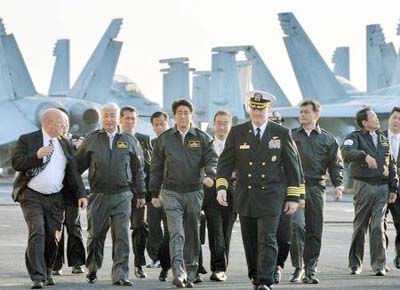
Reuters, Tokyo :
Japan’s Ministry of Finance on Monday called for cuts in the country’s budget spending for U.S. forces stationed in Japan in a bid to restore public finances, a move likely to meet opposition from its key ally Washington.
The move comes after passage of bills last month that aim to tighten the alliance and give Japanese military the biggest global role since the World War Two, with Washington seeking greater Asia-Pacific security in the face of rising China.
Japan’s contribution, or the “sympathy budget”, to cover salaries for workers at U.S. bases, utilities and training expenses, hit 189.9 billion yen ($1.56 billion) for the current fiscal year, versus a 4.98 trillion yen overall defense outlay.
Tokyo also shoulders a big share of expenses for realignment of U.S. forces in Japan, which have led to steady rises in its overall U.S. military-related spending in recent years.
“Taking into account the expansion of Japan’s role through the new security legislation, the yen weakening and the severe fiscal situation, such expenses need to be reviewed and reduced,” the ministry said.
The proposal was presented at an advisory panel to Finance Minister Taro Aso on Monday for discussion as it deliberates on an annual budget for fiscal 2016, to be compiled in December.
The “sympathy budget” began in 1978 against a backdrop of a rapid yen strength, rising inflation in Japan and a worsening fiscal situation in the United States.
Japan and the United States review this budget every five years by concluding an accord. They aim to strike a new deal by the year end to replace the current one that expires next March.
Meanwhile, South Korea said on Monday it had offered Japan a long-awaited leadership summit that would mark a major conciliatory step towards improving relations after an extended period of diplomatic rancour and mistrust.
A spokeswoman for the presidential Blue House said the South had proposed a summit between Japanese Prime Minister Shinzo Abe and President Park Geun-Hye on the side of a trilateral leadership meet being held with China in Seoul next week.
“We have made a proposal to hold the summit on November 2, but have not heard from Japan yet,” the spokeswoman told AFP.
If the summit goes ahead, it will cap a series of moves in recent weeks by Seoul and Tokyo towards a rapprochement — prompted and pushed by their mutual military ally, the United States.
Japan’s Ministry of Finance on Monday called for cuts in the country’s budget spending for U.S. forces stationed in Japan in a bid to restore public finances, a move likely to meet opposition from its key ally Washington.
The move comes after passage of bills last month that aim to tighten the alliance and give Japanese military the biggest global role since the World War Two, with Washington seeking greater Asia-Pacific security in the face of rising China.
Japan’s contribution, or the “sympathy budget”, to cover salaries for workers at U.S. bases, utilities and training expenses, hit 189.9 billion yen ($1.56 billion) for the current fiscal year, versus a 4.98 trillion yen overall defense outlay.
Tokyo also shoulders a big share of expenses for realignment of U.S. forces in Japan, which have led to steady rises in its overall U.S. military-related spending in recent years.
“Taking into account the expansion of Japan’s role through the new security legislation, the yen weakening and the severe fiscal situation, such expenses need to be reviewed and reduced,” the ministry said.
The proposal was presented at an advisory panel to Finance Minister Taro Aso on Monday for discussion as it deliberates on an annual budget for fiscal 2016, to be compiled in December.
The “sympathy budget” began in 1978 against a backdrop of a rapid yen strength, rising inflation in Japan and a worsening fiscal situation in the United States.
Japan and the United States review this budget every five years by concluding an accord. They aim to strike a new deal by the year end to replace the current one that expires next March.
Meanwhile, South Korea said on Monday it had offered Japan a long-awaited leadership summit that would mark a major conciliatory step towards improving relations after an extended period of diplomatic rancour and mistrust.
A spokeswoman for the presidential Blue House said the South had proposed a summit between Japanese Prime Minister Shinzo Abe and President Park Geun-Hye on the side of a trilateral leadership meet being held with China in Seoul next week.
“We have made a proposal to hold the summit on November 2, but have not heard from Japan yet,” the spokeswoman told AFP.
If the summit goes ahead, it will cap a series of moves in recent weeks by Seoul and Tokyo towards a rapprochement — prompted and pushed by their mutual military ally, the United States.

